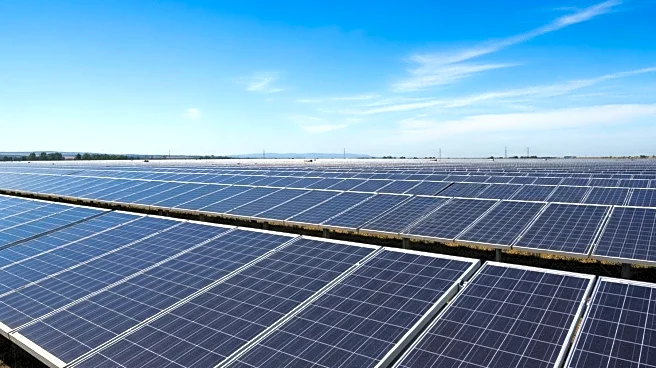What's Happening?
Iraq has inaugurated its first industrial-scale solar plant in the Karbala desert, marking a significant step towards expanding renewable energy production in the country. The solar plant, capable of producing up to 300 megawatts of electricity at its peak, aims to supply the national grid and reduce fuel consumption during peak daytime loads. This initiative is part of Iraq's broader plan to implement large-scale solar power projects to alleviate chronic electricity shortages. Despite Iraq's wealth in oil and gas, the country has faced persistent electricity crises due to war, corruption, and mismanagement. The new solar projects, including those under construction in Babil and Basra provinces, are expected to contribute significantly to Iraq's electricity supply, potentially meeting 15% to 20% of the country's total demand.
Why It's Important?
The opening of Iraq's first industrial-scale solar plant is a crucial development in addressing the country's longstanding electricity shortages. By diversifying its energy sources and reducing reliance on imported Iranian gas, Iraq can mitigate the risks associated with U.S. sanctions on direct electricity purchases from Iran. The solar projects represent a strategic shift towards renewable energy, which could enhance Iraq's energy security and reduce environmental impacts from gas emissions. This move is likely to benefit Iraqi consumers by providing more stable and potentially cheaper electricity, while also positioning Iraq as a regional leader in renewable energy adoption.
What's Next?
Iraq plans to continue expanding its solar energy capacity, with projects totaling 12,500 megawatts either underway, in approval, or under negotiation. These efforts are expected to significantly boost Iraq's electricity production and reduce its dependency on imported energy. As these projects progress, Iraq may attract further investment in renewable energy, potentially leading to economic growth and improved infrastructure. The government will need to navigate the complexities of international sanctions and ensure efficient management to fully realize the benefits of these solar initiatives.
Beyond the Headlines
The shift towards solar energy in Iraq could have broader implications for the region, potentially influencing neighboring countries to adopt similar renewable energy strategies. This transition may also contribute to global efforts to combat climate change by reducing reliance on fossil fuels. Additionally, the success of these projects could inspire further technological innovation and collaboration in the renewable energy sector, fostering a more sustainable future for Iraq and the Middle East.










